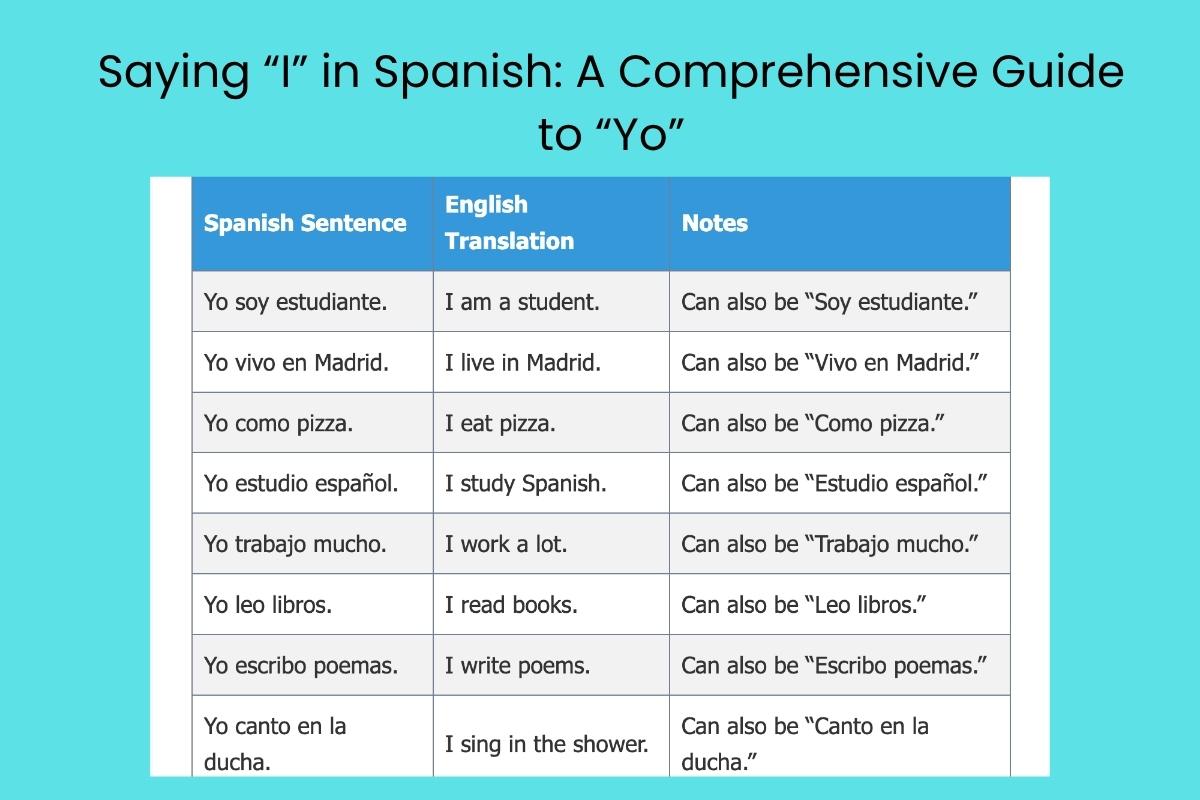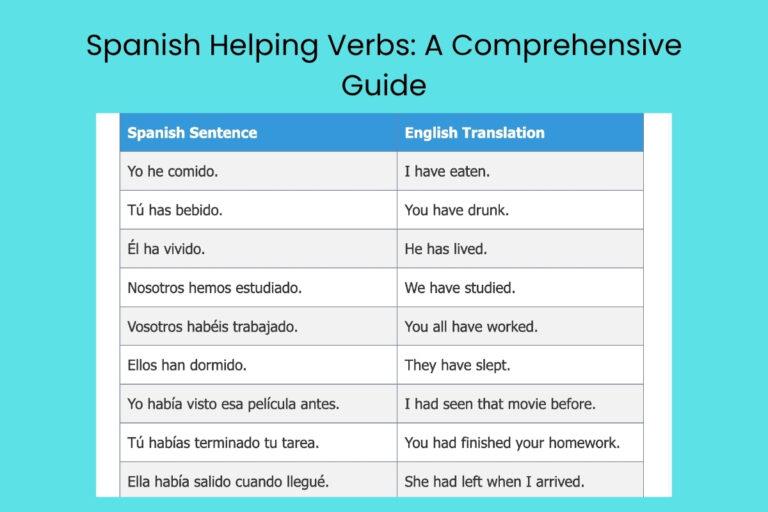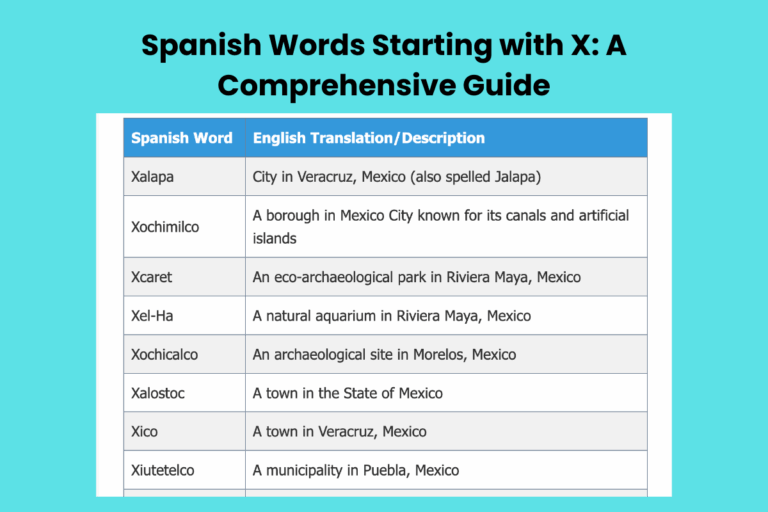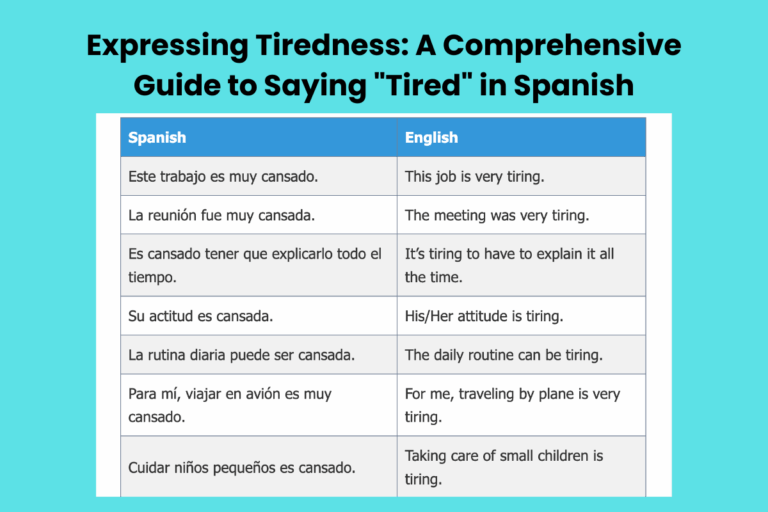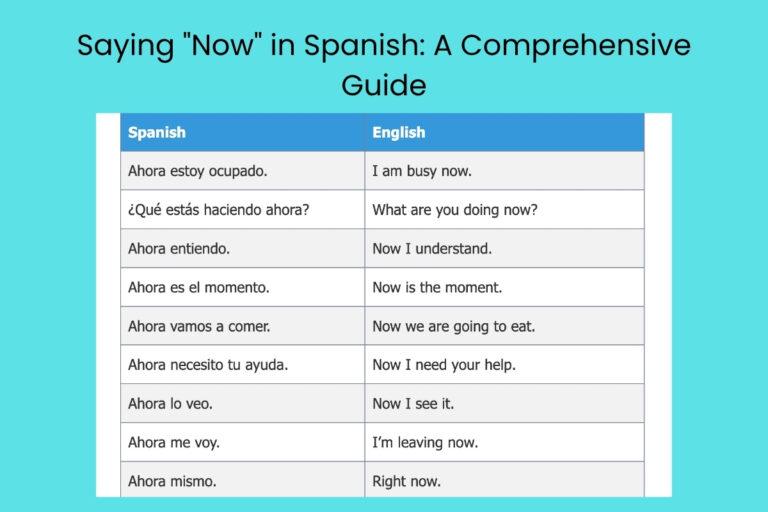Saying “I” in Spanish: A Comprehensive Guide to “Yo”
Understanding how to say “I” in Spanish seems simple, but mastering its nuances is crucial for clear and natural communication. The Spanish word for “I” is yo, and its usage is intertwined with verb conjugations, sentence structure, and even regional variations. This article provides a comprehensive guide to using “yo” effectively, covering everything from basic definitions to advanced considerations. Whether you’re a beginner just starting your Spanish journey or an advanced learner aiming for fluency, this guide will help you confidently express yourself using the first-person singular pronoun.
Table of Contents
- Introduction
- Definition of “Yo”
- Structural Breakdown
- Omission of “Yo”: When to Drop It
- Placement of “Yo” in Sentences
- “Yo” in Different Sentence Types
- Examples of “Yo” in Use
- Usage Rules and Considerations
- Common Mistakes
- Practice Exercises
- Advanced Topics
- Frequently Asked Questions (FAQ)
- Conclusion
Definition of “Yo”
In Spanish, yo is the first-person singular subject pronoun, equivalent to “I” in English. It identifies the speaker or writer as the subject of a sentence. Understanding its function is fundamental to constructing grammatically correct and meaningful Spanish sentences. While seemingly simple, the usage of yo is nuanced and closely tied to verb conjugation and sentence structure.
Classification: Pronoun (specifically, a subject pronoun). A pronoun is a word that replaces a noun or noun phrase.
Function: To indicate the person speaking or writing is the subject of the verb. It tells us who is performing the action.
Contexts: Used in all types of sentences (declarative, interrogative, imperative) where the speaker is the subject. However, its explicit use is often optional due to the information already conveyed by verb conjugations.
Structural Breakdown
The structural role of yo is straightforward. It typically precedes the verb in a sentence, indicating that the action is being performed by the speaker. However, its presence is often unnecessary because Spanish verb conjugations uniquely identify the subject. The verb ending changes depending on the subject pronoun, making yo redundant in many cases.
Consider the following example:
Yo hablo español. (I speak Spanish.)
Here, yo is the subject pronoun, and hablo is the first-person singular conjugation of the verb hablar (to speak). The verb ending “-o” already indicates that the subject is “I,” so the sentence is perfectly understandable (and more common) without yo: Hablo español.
Omission of “Yo”: When to Drop It
One of the most important aspects of using yo correctly is knowing when to omit it. In Spanish, it is generally preferred to omit subject pronouns unless they are needed for emphasis, clarity, or to avoid ambiguity. The verb conjugation usually provides enough information to identify the subject.
Here’s a further breakdown:
- Verb Conjugation: If the verb conjugation clearly indicates the subject is “I,” omit yo. For example, instead of “Yo como,” simply say “Como” (I eat).
- Emphasis: Use yo when you want to emphasize that *you* are the one performing the action. Example: “Yo lo hice” (I did it – emphasizing that *I* was the one who did it).
- Clarity: Use yo when the context is unclear or when there are multiple possible subjects. This is less common, but can occur.
- Contrast: Use yo to contrast yourself with another person. Example: “Yo estudio español, pero él estudia francés” (I study Spanish, but he studies French).
Placement of “Yo” in Sentences
The typical placement of yo is before the verb. However, there are instances where it can be placed elsewhere for emphasis or stylistic reasons. This is less common, but understanding the possibilities is important.
- Before the Verb: This is the most common placement. Example: Yo quiero ir al cine. (I want to go to the cinema.)
- After Adverbs: Sometimes, yo can follow adverbs for emphasis. Example: Quizás yo vaya. (Maybe I’ll go.)
- In Questions: While less common, it can be used in questions for emphasis or clarification. Example: ¿Yo dije eso? (Did I say that?)
“Yo” in Different Sentence Types
The use of yo can vary slightly depending on the type of sentence being constructed. Understanding these nuances will improve your overall fluency.
Declarative Sentences
Declarative sentences are statements of fact. In these sentences, yo is often omitted unless emphasis is needed. Example: Yo trabajo en una oficina. (I work in an office – can be shortened to Trabajo en una oficina.)
Interrogative Sentences
Interrogative sentences are questions. Using yo in questions is less common but can occur for clarification or emphasis. Example: ¿Yo tengo que hacerlo? (Do I have to do it?). More naturally: ¿Tengo que hacerlo?
Imperative Sentences
Imperative sentences are commands or requests. Because imperative sentences often imply the subject, yo is not used in standard imperative constructions. You wouldn’t say “Yo, hazlo” (I, do it). Instead, the imperative form of the verb is used directly.
Examples of “Yo” in Use
To solidify your understanding, let’s look at various examples of yo in different contexts. These examples will illustrate the rules and nuances discussed above.
Basic Examples
The following table provides basic examples of how to use “yo” in simple sentences. Notice how the pronoun is often omitted when the verb conjugation makes the subject clear.
| Spanish Sentence | English Translation | Notes |
|---|---|---|
| Yo soy estudiante. | I am a student. | Can also be “Soy estudiante.” |
| Yo vivo en Madrid. | I live in Madrid. | Can also be “Vivo en Madrid.” |
| Yo como pizza. | I eat pizza. | Can also be “Como pizza.” |
| Yo estudio español. | I study Spanish. | Can also be “Estudio español.” |
| Yo trabajo mucho. | I work a lot. | Can also be “Trabajo mucho.” |
| Yo leo libros. | I read books. | Can also be “Leo libros.” |
| Yo escribo poemas. | I write poems. | Can also be “Escribo poemas.” |
| Yo canto en la ducha. | I sing in the shower. | Can also be “Canto en la ducha.” |
| Yo bailo salsa. | I dance salsa. | Can also be “Bailo salsa.” |
| Yo corro cada mañana. | I run every morning. | Can also be “Corro cada mañana.” |
| Yo nado en la piscina. | I swim in the pool. | Can also be “Nado en la piscina.” |
| Yo viajo por el mundo. | I travel the world. | Can also be “Viajo por el mundo.” |
| Yo cocino pasta. | I cook pasta. | Can also be “Cocino pasta.” |
| Yo limpio la casa. | I clean the house. | Can also be “Limpio la casa.” |
| Yo lavo los platos. | I wash the dishes. | Can also be “Lavo los platos.” |
| Yo plancho la ropa. | I iron the clothes. | Can also be “Plancho la ropa.” |
| Yo cuido a mi perro. | I take care of my dog. | Can also be “Cuido a mi perro.” |
| Yo riego las plantas. | I water the plants. | Can also be “Riego las plantas.” |
| Yo hablo por teléfono. | I talk on the phone. | Can also be “Hablo por teléfono.” |
| Yo miro la televisión. | I watch television. | Can also be “Miro la televisión.” |
| Yo escucho música. | I listen to music. | Can also be “Escucho música.” |
| Yo pienso en ti. | I think of you. | Can also be “Pienso en ti.” |
With Reflexive Verbs
Reflexive verbs describe actions that the subject performs on themselves. In these cases, the reflexive pronoun (me, te, se, nos, os, se) is used in conjunction with the verb. While “yo” can be included, it’s often omitted for brevity.
The following table illustrates the usage of “yo” with reflexive verbs. Again, note the frequent omission.
| Spanish Sentence | English Translation | Notes |
|---|---|---|
| Yo me levanto temprano. | I get up early. | Can also be “Me levanto temprano.” |
| Yo me acuesto tarde. | I go to bed late. | Can also be “Me acuesto tarde.” |
| Yo me lavo las manos. | I wash my hands. | Can also be “Me lavo las manos.” |
| Yo me visto rápidamente. | I get dressed quickly. | Can also be “Me visto rápidamente.” |
| Yo me peino el pelo. | I comb my hair. | Can also be “Me peino el pelo.” |
| Yo me maquillo a veces. | I put on makeup sometimes. | Can also be “Me maquillo a veces.” |
| Yo me afeito la barba. | I shave my beard. | Can also be “Me afeito la barba.” |
| Yo me ducho cada día. | I shower every day. | Can also be “Me ducho cada día.” |
| Yo me seco el pelo. | I dry my hair. | Can also be “Me seco el pelo.” |
| Yo me preparo el desayuno. | I prepare breakfast for myself. | Can also be “Me preparo el desayuno.” |
| Yo me relajo en casa. | I relax at home. | Can also be “Me relajo en casa.” |
| Yo me divierto con mis amigos. | I have fun with my friends. | Can also be “Me divierto con mis amigos.” |
| Yo me preocupo por ti. | I worry about you. | Can also be “Me preocupo por ti.” |
| Yo me enojo fácilmente. | I get angry easily. | Can also be “Me enojo fácilmente.” |
| Yo me calmo después. | I calm down afterwards. | Can also be “Me calmo después.” |
| Yo me siento feliz. | I feel happy. | Can also be “Me siento feliz.” |
| Yo me aburro a veces. | I get bored sometimes. | Can also be “Me aburro a veces.” |
| Yo me quejo del tiempo. | I complain about the weather. | Can also be “Me quejo del tiempo.” |
| Yo me arrepiento de nada. | I regret nothing. | Can also be “Me arrepiento de nada.” |
| Yo me concentro en mi trabajo. | I concentrate on my work. | Can also be “Me concentro en mi trabajo.” |
| Yo me esfuerzo mucho. | I try very hard. | Can also be “Me esfuerzo mucho.” |
With Verbs Like Gustar
Verbs like gustar (to like) have a different structure in Spanish. The thing that is liked is the subject, and the person who likes it is expressed with an indirect object pronoun (me, te, le, nos, os, les). In these cases, “yo” is represented by “me.” It is often clarified with the construction “A mí” + “me gusta…” to emphasize who likes something.
Here are some examples using verbs like gustar:
| Spanish Sentence | English Translation | Notes |
|---|---|---|
| A mí me gusta el chocolate. | I like chocolate. | “Me gusta el chocolate” is also correct. |
| A mí me encanta viajar. | I love to travel. | “Me encanta viajar” is also correct. |
| A mí me interesa la historia. | I am interested in history. | “Me interesa la historia” is also correct. |
| A mí me aburre la televisión. | Television bores me. | “Me aburre la televisión” is also correct. |
| A mí me molesta el ruido. | The noise bothers me. | “Me molesta el ruido” is also correct. |
| A mí me fascina la astronomía. | I am fascinated by astronomy. | “Me fascina la astronomía” is also correct. |
| A mí me preocupa el futuro. | I am worried about the future. | “Me preocupa el futuro” is also correct. |
| A mí me divierte jugar videojuegos. | I enjoy playing video games. | “Me divierte jugar videojuegos” is also correct. |
| A mí me duele la cabeza. | My head hurts. | “Me duele la cabeza” is also correct. |
| A mí me cuesta entender esto. | I find it hard to understand this. | “Me cuesta entender esto” is also correct. |
| A mí me parece bien. | It seems good to me. | “Me parece bien” is also correct. |
| A mí me queda bien esta camisa. | This shirt fits me well. | “Me queda bien esta camisa” is also correct. |
| A mí me toca lavar los platos. | It’s my turn to wash the dishes. | “Me toca lavar los platos” is also correct. |
| A mí me importa tu opinión. | Your opinion matters to me. | “Me importa tu opinión” is also correct. |
| A mí me da miedo la oscuridad. | I am afraid of the dark. | “Me da miedo la oscuridad” is also correct. |
| A mí me da igual. | I don’t care. | “Me da igual” is also correct. |
| A mí me da vergüenza hablar en público. | I am embarrassed to speak in public. | “Me da vergüenza hablar en público” is also correct. |
| A mí me da risa esa película. | That movie makes me laugh. | “Me da risa esa película” is also correct. |
| A mí me da pena verte triste. | It makes me sad to see you sad. | “Me da pena verte triste” is also correct. |
| A mí me da asco la sangre. | Blood disgusts me. | “Me da asco la sangre” is also correct. |
In Compound Sentences
Compound sentences consist of two or more independent clauses joined by conjunctions. The use of “yo” in compound sentences follows the same rules as in simple sentences: omit it unless needed for emphasis, clarity, or contrast.
Here are examples of compound sentences using “yo”:
| Spanish Sentence | English Translation | Notes |
|---|---|---|
| Yo estudio español y mi hermana estudia inglés. | I study Spanish and my sister studies English. | “Estudio español y mi hermana estudia inglés” is also correct. |
| Yo quiero ir al cine, pero no tengo tiempo. | I want to go to the cinema, but I don’t have time. | “Quiero ir al cine, pero no tengo tiempo” is also correct. |
| Yo trabajo mucho, así que estoy cansado. | I work a lot, so I am tired. | “Trabajo mucho, así que estoy cansado” is also correct. |
| Yo como pizza y tú comes pasta. | I eat pizza and you eat pasta. | Emphasizes the difference in what each person eats. |
| Yo hablo español, pero mi amigo habla francés. | I speak Spanish, but my friend speaks French. | Emphasizes the contrast in languages spoken. |
| Yo leo libros y mi esposo mira la televisión. | I read books and my husband watches television. | “Leo libros y mi esposo mira la televisión” is also correct. |
| Yo escribo correos electrónicos y mi colega hace llamadas. | I write emails and my colleague makes calls. | “Escribo correos electrónicos y mi colega hace llamadas” is also correct. |
| Yo canto en la ducha y mi vecino se queja. | I sing in the shower and my neighbor complains. | “Canto en la ducha y mi vecino se queja” is also correct. |
| Yo bailo salsa y mi pareja baila tango. | I dance salsa and my partner dances tango. | “Bailo salsa y mi pareja baila tango” is also correct. |
| Yo corro por la mañana y tú corres por la tarde. | I run in the morning and you run in the afternoon. | “Corro por la mañana y tú corres por la tarde” is also correct. |
| Yo nado en la piscina y mi hijo juega en el parque. | I swim in the pool and my son plays in the park. | “Nado en la piscina y mi hijo juega en el parque” is also correct. |
| Yo viajo mucho, pero mi familia prefiere quedarse en casa. | I travel a lot, but my family prefers to stay at home. | “Viajo mucho, pero mi familia prefiere quedarse en casa” is also correct. |
| Yo cocino la cena y mi esposo lava los platos. | I cook dinner and my husband washes the dishes. | “Cocino la cena y mi esposo lava los platos” is also correct. |
| Yo limpio la casa, pero mi hijo la ensucia de nuevo. | I clean the house, but my son dirties it again. | “Limpio la casa, pero mi hijo la ensucia de nuevo” is also correct. |
| Yo lavo la ropa y mi hija la dobla. | I wash the clothes and my daughter folds them. | “Lavo la ropa y mi hija la dobla” is also correct. |
| Yo plancho la ropa, aunque no me gusta hacerlo. | I iron the clothes, even though I don’t like to do it. | “Plancho la ropa, aunque no me gusta hacerlo” is also correct. |
| Yo cuido a mi perro y mi gato me ignora. | I take care of my dog and my cat ignores me. | “Cuido a mi perro y mi gato me ignora” is also correct. |
| Yo riego las plantas, así que están muy verdes. | I water the plants, so they are very green. | “Riego las plantas, así que están muy verdes” is also correct. |
| Yo hablo por teléfono y mi jefe me interrumpe. | I talk on the phone and my boss interrupts me. | “Hablo por teléfono y mi jefe me interrumpe” is also correct. |
| Yo miro la televisión y mi hijo juega videojuegos. | I watch television and my son plays video games. | “Miro la televisión y mi hijo juega videojuegos” is also correct. |
In Conditional Sentences
Conditional sentences express hypothetical situations and their consequences. “Yo” is used in the same way as in other sentence types, with the option to omit it when the verb conjugation is clear.
Here are examples of conditional sentences using “yo”:
| Spanish Sentence | English Translation | Notes |
|---|---|---|
| Si yo tuviera dinero, viajaría por el mundo. | If I had money, I would travel the world. | “Si tuviera dinero, viajaría por el mundo” is also correct. |
| Si yo fuera tú, aceptaría el trabajo. | If I were you, I would accept the job. | “Si fuera tú, aceptaría el trabajo” is also correct. |
| Si yo estudiara más, sacaría mejores notas. | If I studied more, I would get better grades. | “Si estudiara más, sacaría mejores notas” is also correct. |
| Si yo supiera la respuesta, te la diría. | If I knew the answer, I would tell you. | “Si supiera la respuesta, te la diría” is also correct. |
| Si yo pudiera, te ayudaría. | If I could, I would help you. | “Si pudiera, te ayudaría” is also correct. |
| Si yo tuviera tiempo, iría al gimnasio. | If I had time, I would go to the gym. | “Si tuviera tiempo, iría al gimnasio” is also correct. |
| Si yo fuera rico, compraría una casa grande. | If I were rich, I would buy a big house. | “Si fuera rico, compraría una casa grande” is also correct. |
| Si yo ganara la lotería, dejaría mi trabajo. | If I won the lottery, I would quit my job. | “Si ganara la lotería, dejaría mi trabajo” is also correct. |
| Si yo hablara inglés, conseguiría un mejor empleo. | If I spoke English, I would get a better job. | “Si hablara inglés, conseguiría un mejor empleo” is also correct. |
| Si yo viviera en España, hablaría español todos los días. | If I lived in Spain, I would speak Spanish every day. | “Si viviera en España, hablaría español todos los días” is also correct. |
| Si yo comiera más sano, me sentiría mejor. | If I ate healthier, I would feel better. | “Si comiera más sano, me sentiría mejor” is also correct. |
| Si yo leyera más, sería más culto. | If I read more, I would be more cultured. | “Si leyera más, sería más culto” is also correct. |
| Si yo escribiera un libro, sería sobre mi vida. | If I wrote a book, it would be about my life. | “Si escribiera un libro, sería sobre mi vida” is also correct. |
| Si yo cantara bien, sería cantante. | If I sang well, I would be a singer. | “Si cantara bien, sería cantante” is also correct. |
| Si yo bailara mejor, participaría en un concurso. | If I danced better, I would participate in a contest. | “Si bailara mejor, participaría en un concurso” is also correct. |
| Si yo corriera más rápido, ganaría la carrera. | If I ran faster, I would win the race. | “Si corriera más rápido, ganaría la carrera” is also correct. |
| Si yo nadara mejor, cruzaría el río. | If I swam better, I would cross the river. | “Si nadara mejor, cruzaría el río” is also correct. |
| Si yo viajara solo, conocería gente nueva. | If I traveled alone, I would meet new people. | “Si viajara solo, conocería gente nueva” is also correct. |
| Si yo cocinara mejor, sería chef. | If I cooked better, I would be a chef. | “Si cocinara mejor, sería chef” is also correct. |
| Si yo limpiara más, mi casa estaría más ordenada. | If I cleaned more, my house would be more organized. | “Si limpiara más, mi casa estaría más ordenada” is also correct. |
Usage Rules and Considerations
Mastering the usage of “yo” involves understanding several key rules and considerations. These guidelines will help you use the pronoun correctly and naturally in various contexts.
Emphasis and Clarity
As mentioned earlier, use yo when you want to emphasize that *you* are the one performing the action, or when the context is unclear and you need to specify the subject. Consider these examples:
- Emphasis: Yo lo dije, no él. (I said it, not him.)
- Clarity: (In a situation where multiple people are present) Yo voy a la tienda. (I am going to the store.)
Formal Writing
In formal writing, the rules for omitting yo remain the same. However, some writers prefer to use it more frequently for added clarity, especially in complex sentences. The key is to maintain consistency and avoid unnecessary repetition.
Regional Variations
While the basic rules for using yo are consistent across Spanish-speaking regions, there might be slight variations in frequency of use and stylistic preferences. Pay attention to how native speakers in different regions use the pronoun and adapt accordingly.
Common Mistakes
Here are some common mistakes that learners make when using “yo,” along with corrections:
| Incorrect | Correct | Explanation |
|---|---|---|
| Yo como. Yo bebo. | Como. Bebo. | Unnecessary repetition of “yo.” |
| ¿Yo necesito ayuda? | ¿Necesito ayuda? | The verb conjugation already indicates the subject. |
| A yo me gusta el café. | A mí me gusta el café. | Correct form is “A mí” to clarify “me.” |
| Yo es estudiante. | Yo soy estudiante. | Incorrect verb conjugation. |
| Yo hago la tarea y yo veo la tele. | Hago la tarea y veo la tele. | Unnecessary repetition in a compound sentence. |
Practice Exercises
Test your understanding with these practice exercises. Fill in the blanks with “yo” only when necessary.
If “yo” is not needed, leave the space blank.
| Question | Answer |
|---|---|
| _____ hablo español. | Hablo |
| _____ soy de España. | Soy |
| _____ quiero ir al cine. | Quiero |
| _____ estudio mucho. | Estudio |
| _____ trabajo en una oficina. | Trabajo |
| (Emphasis) _____ lo hice. | Yo |
| _____ me llamo Juan. | Me |
| _____ no entiendo. | No entiendo |
| _____ prefiero el té. | Prefiero |
| _____ necesito ayuda. | Necesito |
Exercise 2: Rewrite the following sentences, adding “yo” only when it is necessary for emphasis or
clarity.
Advanced Topics
For those looking to delve deeper, here are some advanced topics related to “yo” that can further refine your understanding and usage.
“Yo” vs. “Mí”
It’s crucial to distinguish between “yo” and “mí.” While “yo” is a subject pronoun, “mí” is an object of a preposition and is used after prepositions like a (to), para (for), de (of/from), con (with), etc.
Examples:
- Para mí (for me)
- A mí me gusta (I like)
- De mí (from me)
- Conmigo (with me – a special form of “con” + “mí”)
Incorrect: Para yo
Correct: Para mí
“Yo” with Prepositions
As mentioned above, after prepositions, you should use “mí” instead of “yo,” except in the special case of “conmigo” (with me). This is a common area of confusion for Spanish learners.
Examples:
- Él viene conmigo. (He is coming with me.)
- Este regalo es para mí. (This gift is for me.)
- Ella está hablando de mí. (She is talking about me.)
Frequently Asked Questions (FAQ)
Conclusion
Mastering the use of “yo” in Spanish is a fundamental step towards fluency. While it may seem simple at first glance, understanding the nuances of when to include or omit this pronoun can significantly improve your communication skills.
By following the guidelines and examples provided in this article, you’ll be well-equipped to use “yo” effectively and confidently in a variety of contexts. Keep practicing and listening to native speakers, and you’ll soon find that using “yo” (or not using it) becomes second nature.

